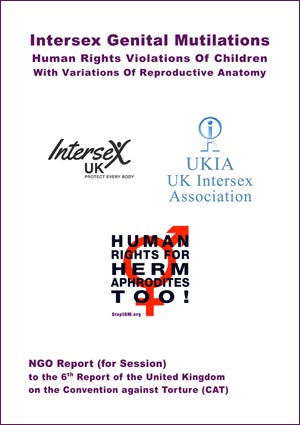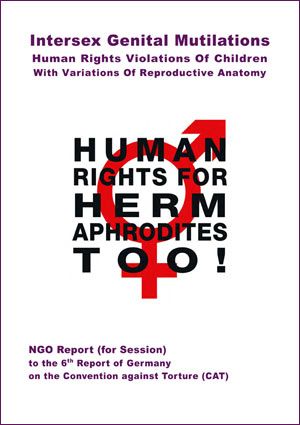 NGO Report (for Session) to the 8th
Report of the United Kingdom on the Convention against Torture
(CAT)
NGO Report (for Session) to the 8th
Report of the United Kingdom on the Convention against Torture
(CAT)
>>> Download: PDF (623
kb)
Compiled by:
Intersex NGO Coalition UK
IntersexUK • UK Intersex Association
StopIGM.org / Zwischengeschlecht.org
CAT Chronology UK 2018-19
• Above January 2019 Thematic Intersex NGO Report provided solid evidence of ongoing IGM practices with impunity in all 4 Nations of the UK, advocated and paid for by the State party (p. 10-16), how UK doctors and the NHS conciously dismiss human rights concerns (p. 16). In addition, it contains personal testimony of IGM survivors (20-26).
• On Monday 8 May 2019 NGOs briefed the Committee in a private NGO meeting. For StopIGM.org / Zwischengeschlecht.org, UK IGM survivor Anick provided personal testimony and highlighted the failure of the government to live up to its promises. (Full statement coming soon.)
• On Tuesday 9 + Wednesday 10 May 2019 the human rights record of the UK was examined in Geneva during the 66th CAT session, including a question on IGM and a weak answer by the Delegation. >>> Transcript + Video
• YAY!! Later in May 2019 CAT published its Concluding observations (CAT/C/GBR/CO/6, paras 64-65) with binding recommendations for the UK – including yet another strong reprimand for IGM practices for the United Kindgdom:
Intersex persons
64. While noting that in January 2019 the Government Equalities Office launched a call for evidence to better understand the experiences of intersex persons in the United Kingdom, the Committee remains concerned about reports of cases of unnecessary surgery and other medical treatment with lifelong consequences, including severe pain and suffering, to which intersex children have been subjected. The Committee is further concerned about the lack of legal provisions providing redress and rehabilitation in such cases (arts. 14 and 16).
65. The State party should ensure that:
(a) The parents or guardians of intersex children receive impartial counselling services and psychological and social support, including information on the possibility of deferring any decision on unnecessary treatment until they can be carried out with the full, free and informed consent of the person concerned;
(b) Persons who have been subjected to such procedures without their consent and resulting in severe pain and suffering obtain redress, including the means for rehabilitation.
